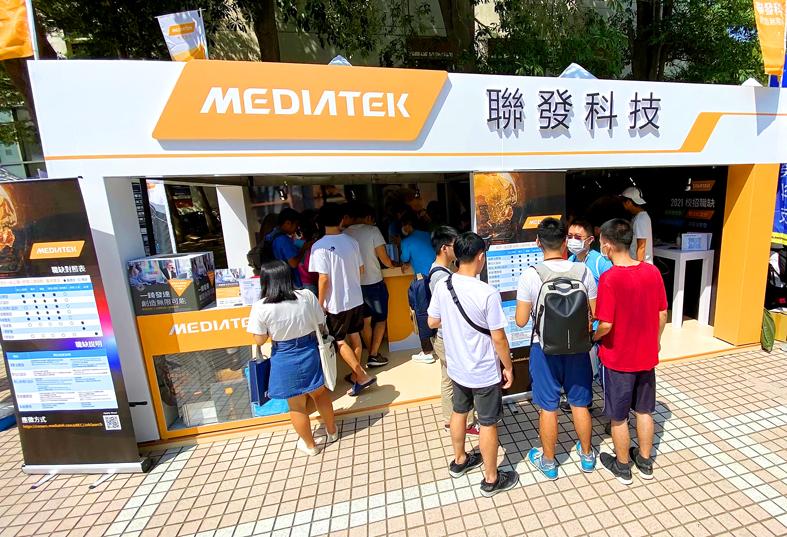Handset chip supplier MediaTek Inc (聯發科) yesterday posted a record net profit for last quarter and reiterated its revenue growth target of 20 percent for this year on robust demand for 5G smartphone chips from markets outside China.
MediaTek has greater exposure to the Chinese market, but investors are increasingly concerned that China’s COVID-19 lockdowns are slowing its economy, and weakening demand for smartphones and computers.
Investors are also concerned about a possible price war being waged by MediaTek’s rivals.

Photo courtesy of MediaTek Inc
“MediaTek is now in a very strong global market position backed by our leading technology and broad product portfolio, which enables us to better deal with competition and market uncertainties,” MediaTek CEO Rick Tsai (蔡力行) told an online investors’ conference.
The firm is pushing for a migration to its 5G, Wi-Fi and TV chips, and expanding its geographic footprint with global customers, Tsai said, adding that the firm enjoys a competitive advantage in the high-end and 5G phone chip businesses.
MediaTek expects to double its 5G chip shipments to markets outside China this year.
“We believe we are on the right track toward our 2022 revenue growth target of 20 percent annually,” Tsai said.
The firm has so far met its goal of keeping gross margin between 48 and 50 percent, and maintaining a three-year rate for composite annual revenue growth of 15 percent, Tsai added.
However, MediaTek revised downward a forecast for global 5G smartphone shipments to between 660 million and 680 million units this year, down from a forecast of 700 million units three months ago, citing fallout from uncertainty over the global economy.
MediaTek still expects 5G smartphone penetration to climb to 50 percent this year, from 30 percent last year, it said, adding that it expects the penetration rate to climb to 70 percent over the next two years.
“The impact is manageable,” MediaTek chief financial officer David Ku (顧大為) said.
Addressing investors’ concerns over a potential price war, Tsai said the company did not “believe that the race to the bottom is a good or effective strategy.”
In a tough market environment, cutting prices “does not really generate much incremental demand,” he added.
MediaTek expects revenue this quarter to grow between 3 and 10 percent from NT$142.71 billion (US$4.85 billion) last quarter. That would represent an annual expansion of between 17 and 25 percent.
Mobile phone chips are likely to grow the fastest as MediaTek’s new high-end 5G chips — the Dimensity 9000, 8100 and 8000 — are to be available in more markets, including India, Europe and Southeast Asia, it said, adding that demand is also increasing for its 4G smartphone chips, Wi-Fi chips and power management chips.
Gross margin this quarter is likely to edge downward to between 47.5 and 50.5 percent from 50.3 percent last quarter, which was the highest since the third quarter of 2010.
Last quarter, net profit expanded 29.6 percent to NT$33.41 billion from NT$25.78 billion a year earlier, rising 10.8 percent from NT$30.15 billion the previous quarter.
The company’s board of directors has proposed the distribution of a cash dividend of NT$73 per share, it added.

Quanta Computer Inc (廣達) chairman Barry Lam (林百里) is expected to share his views about the artificial intelligence (AI) industry’s prospects during his speech at the company’s 37th anniversary ceremony, as AI servers have become a new growth engine for the equipment manufacturing service provider. Lam’s speech is much anticipated, as Quanta has risen as one of the world’s major AI server suppliers. The company reported a 30 percent year-on-year growth in consolidated revenue to NT$1.41 trillion (US$43.35 billion) last year, thanks to fast-growing demand for servers, especially those with AI capabilities. The company told investors in November last year that

United Microelectronics Corp (UMC, 聯電) forecast that its wafer shipments this quarter would grow up to 7 percent sequentially and the factory utilization rate would rise to 75 percent, indicating that customers did not alter their ordering behavior due to the US President Donald Trump’s capricious US tariff policies. However, the uncertainty about US tariffs has weighed on the chipmaker’s business visibility for the second half of this year, UMC chief financial officer Liu Chi-tung (劉啟東) said at an online earnings conference yesterday. “Although the escalating trade tensions and global tariff policies have increased uncertainty in the semiconductor industry, we have not

Intel Corp has named Tasha Chuang (莊蓓瑜) to lead Intel Taiwan in a bid to reinforce relations between the company and its Taiwanese partners. The appointment of Chuang as general manager for Intel Taiwan takes effect on Thursday, the firm said in a statement yesterday. Chuang is to lead her team in Taiwan to pursue product development and sales growth in an effort to reinforce the company’s ties with its partners and clients, Intel said. Chuang was previously in charge of managing Intel’s ties with leading Taiwanese PC brand Asustek Computer Inc (華碩), which included helping Asustek strengthen its global businesses, the company

Power supply and electronic components maker Delta Electronics Inc (台達電) yesterday said it plans to ship its new 1 megawatt charging systems for electric trucks and buses in the first half of next year at the earliest. The new charging piles, which deliver up to 1 megawatt of charging power, are designed for heavy-duty electric vehicles, and support a maximum current of 1,500 amperes and output of 1,250 volts, Delta said in a news release. “If everything goes smoothly, we could begin shipping those new charging systems as early as in the first half of next year,” a company official said. The new